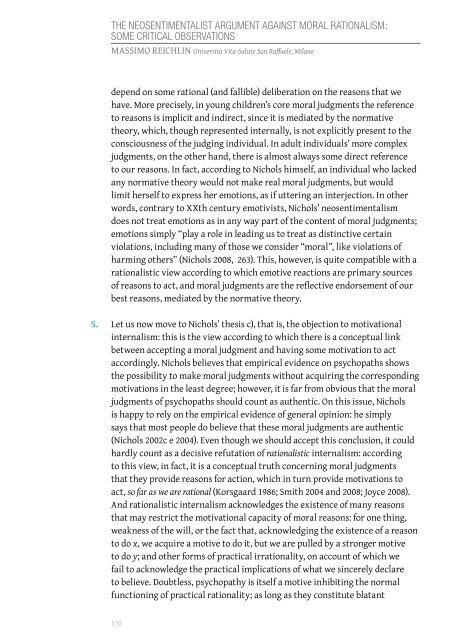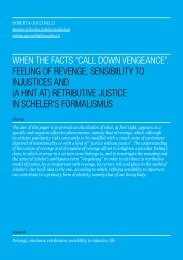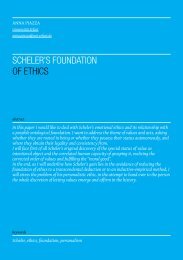the neosentimentalist argument against moral rationalism
the neosentimentalist argument against moral rationalism
the neosentimentalist argument against moral rationalism
You also want an ePaper? Increase the reach of your titles
YUMPU automatically turns print PDFs into web optimized ePapers that Google loves.
5.<br />
<strong>the</strong> neosentiMentalist aRGuMent aGainst MoRal RationalisM:<br />
soMe CRitiCal oBseRVations<br />
massimo reichlin università Vita-Salute San raffaele, milano<br />
depend on some rational (and fallible) deliberation on <strong>the</strong> reasons that we<br />
have. more precisely, in young children’s core <strong>moral</strong> judgments <strong>the</strong> reference<br />
to reasons is implicit and indirect, since it is mediated by <strong>the</strong> normative<br />
<strong>the</strong>ory, which, though represented internally, is not explicitly present to <strong>the</strong><br />
consciousness of <strong>the</strong> judging individual. in adult individuals’ more complex<br />
judgments, on <strong>the</strong> o<strong>the</strong>r hand, <strong>the</strong>re is almost always some direct reference<br />
to our reasons. in fact, according to nichols himself, an individual who lacked<br />
any normative <strong>the</strong>ory would not make real <strong>moral</strong> judgments, but would<br />
limit herself to express her emotions, as if uttering an interjection. in o<strong>the</strong>r<br />
words, contrary to XXth century emotivists, Nichols’ neosentimentalism<br />
does not treat emotions as in any way part of <strong>the</strong> content of <strong>moral</strong> judgments;<br />
emotions simply “play a role in leading us to treat as distinctive certain<br />
violations, including many of those we consider “<strong>moral</strong>”, like violations of<br />
harming o<strong>the</strong>rs” (nichols 2008, 263). this, however, is quite compatible with a<br />
rationalistic view according to which emotive reactions are primary sources<br />
of reasons to act, and <strong>moral</strong> judgments are <strong>the</strong> reflective endorsement of our<br />
best reasons, mediated by <strong>the</strong> normative <strong>the</strong>ory.<br />
let us now move to nichols’ <strong>the</strong>sis c), that is, <strong>the</strong> objection to motivational<br />
internalism: this is <strong>the</strong> view according to which <strong>the</strong>re is a conceptual link<br />
between accepting a <strong>moral</strong> judgment and having some motivation to act<br />
accordingly. nichols believes that empirical evidence on psychopaths shows<br />
<strong>the</strong> possibility to make <strong>moral</strong> judgments without acquiring <strong>the</strong> corresponding<br />
motivations in <strong>the</strong> least degree; however, it is far from obvious that <strong>the</strong> <strong>moral</strong><br />
judgments of psychopaths should count as au<strong>the</strong>ntic. on this issue, nichols<br />
is happy to rely on <strong>the</strong> empirical evidence of general opinion: he simply<br />
says that most people do believe that <strong>the</strong>se <strong>moral</strong> judgments are au<strong>the</strong>ntic<br />
(nichols 2002c e 2004). even though we should accept this conclusion, it could<br />
hardly count as a decisive refutation of rationalistic internalism: according<br />
to this view, in fact, it is a conceptual truth concerning <strong>moral</strong> judgments<br />
that <strong>the</strong>y provide reasons for action, which in turn provide motivations to<br />
act, so far as we are rational (Korsgaard 1986; smith 2004 and 2008; Joyce 2008).<br />
and rationalistic internalism acknowledges <strong>the</strong> existence of many reasons<br />
that may restrict <strong>the</strong> motivational capacity of <strong>moral</strong> reasons: for one thing,<br />
weakness of <strong>the</strong> will, or <strong>the</strong> fact that, acknowledging <strong>the</strong> existence of a reason<br />
to do x, we acquire a motive to do it, but we are pulled by a stronger motive<br />
to do y; and o<strong>the</strong>r forms of practical irrationality, on account of which we<br />
fail to acknowledge <strong>the</strong> practical implications of what we sincerely declare<br />
to believe. doubtless, psychopathy is itself a motive inhibiting <strong>the</strong> normal<br />
functioning of practical rationality; as long as <strong>the</strong>y constitute blatant<br />
170




